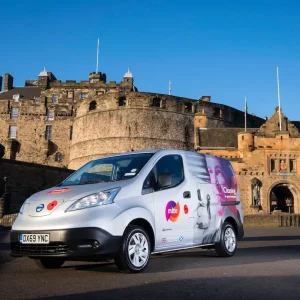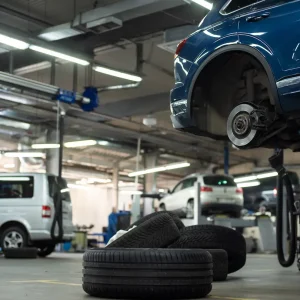2021 has been quite the year. As the world continued to battle waves of the Covid-19 pandemic, Joe Biden became president, and COP26 saw leaders come together to face up to climate change. Here in the UK, industry has experienced profound change too – perhaps none more so than the automotive sector.
The rising cost of fuel, drastic changes to electric vehicle (EV) incentives, and the growth of clean air zones have kept us on our toes. Then there’s the issue of Fuel Duty, which continues to be the elephant in the room at Westminster.
As we go forward into next year, there’s more change ahead. But we could also get answers to questions that have been burning away for some time, which could bring greater clarity to our industry. Here are our top five predictions for what’s in store for the fleet sector in 2022.
1. The government may clarify the future of Fuel Duty
In the short term, we know what’s happening with Fuel Duty. In his Autumn Budget, perhaps mindful of the sky-high prices at the pump, Rishi Sunak announced that it would be frozen at 57.95 pence per litre for the 12th year in a row – until at least April 2023.
But there’s a bigger question surrounding Fuel Duty in the medium-to-long term: what will the Chancellor do about the lost revenues as we switch to EVs? The Tony Blair Institute has calculated that the Exchequer stands to lose about £30 billion by 2040 – that’s a significant loss of income for the government.
Fundamentally, this means that the government will need to find a way of raising money from EV drivers, too. However, despite much speculation and anticipation from fleet managers thinking of making the switch, these plans weren’t featured in the Autumn Budget. This means that they could be due in 2022.
2. Additional government legislation to accelerate electrification could be confirmed
Fuel Duty isn’t the only motoring tax on the government’s to-do list. We’re still waiting for a number of potential changes to Vehicle Excise Duty (VED), following numerous announcements by Chancellors over the years. Back in 2018, Philip Hammond embarked on a consultation to discover how VED could better encourage the uptake of cleaner vans. And then, in 2020, Sunak did likewise for cars. Neither of these processes have resulted in any legislation – yet.
In fact, if we look beyond taxes, we’re still waiting for the government to announce the outcomes of a number of other reviews that will also impact fleets. For example, in the summer of 2021, they launched consultations into the possibility of a zero-emissions vehicle mandate.
Of course, some reviews do just fizzle out – we shouldn’t necessarily expect to have all these policy questions resolved soon. But the fact remains: there are several legislative interventions that the government is due to make along the Road to Zero – and some of them could be announced this coming year.
3. The government may continue to chip away at EV incentives
There are of course some policy changes that the government have already set in stone.
From April 2022, the Electric Vehicle Homecharge Scheme (EVHS) – which currently offsets 75% of the cost of installing a charge point at home, up to a maximum of £350 – will no longer be available to homeowners in single-unit properties. Instead, this subsidy will be refocused on leaseholders, renters and those living in flats. A positive move to redirect funding where it’s needed most, but a notable step in the direction of the removal of EV incentives.
After this announcement, many expected that electric car grants would be removed completely. Instead, the government recently announced cuts to the plug-in car and van grants. While it’s promising that the grant wasn’t scrapped altogether, there’s a chance that it might end up being reduced so much that by the time it stops, its unnoticeable.
As we’re making real headway on our journey to EV, it’s no surprise that the government are chipping away at incentives. And it’s highly likely that we’ll see more development as 2022 unfolds.
4. Clean air zones will continue to pop up
While EVs are certainly starting to tip the scales, it’ll take some time for the whole country to go electric. That’s why local governments and councils are implementing clean air zones (CAZ), where special action is taken to reduce emissions from road transport and improve air quality.
In 2021, not only did London expand its Ultra-Low Emission Zone to the North and South Circular Roads, but Bath, Birmingham and Portsmouth also introduced their own CAZs. And it doesn’t stop there – we can expect plenty more in 2022.
For example, Bristol is awaiting final sign-off for a small CAZ in the city centre that would impose a £9 daily fee on cars and vans that don’t meet minimum emission standards. Similarly, Greater Manchester has earmarked the end of May for its own CAZ, and Bradford, Sheffield, Oxford are starting to share their plans too.
The rise of CAZs – each with their own standards and charges – means that the country is going become a sort of legislative patchwork in the years ahead. Fleet managers will need to be prepared for the effects wherever they operate.
5. The pandemic will continue to impact our industry
As we start 2022 off with a new variant, and more UK Covid-19 cases than any other point during the pandemic, it’s difficult not to wonder what next year will have in store. Of course, we’re all more accustomed to constant change by now, but that doesn’t make things any easier.
The important thing to note is that Covid-19 has not gone away – and neither have its effects on the economy and supply chains. The semiconductor shortages that have affected vehicle production and delivery in 2021 are, according to many manufacturers, going to persist in 2022.
While there are many unknowns to navigate as we head into next year, what’s vital is that we all remain vigilant. Fleet managers should focus on staying up to date with legislative changes, providing drivers with everything they need to know, and planning ahead as much as possible. There may not be a clear and obvious path for the UK motoring industry to take in 2022, but we’re confident that we can continue to lead the journey to electrification and keep everyone on the road.
Alfonso Martinez is managing director of Leaseplan UK





